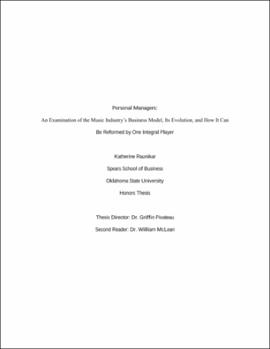| dc.contributor.author | Raunikar, Katherine | |
| dc.date.accessioned | 2021-04-19T21:27:13Z | |
| dc.date.available | 2021-04-19T21:27:13Z | |
| dc.date.issued | 2016-04-19 | |
| dc.identifier | oksd_raunikar_HT_2016 | |
| dc.identifier.uri | https://hdl.handle.net/11244/329275 | |
| dc.description.abstract | The past two decades have seen momentous change in the music industry. The digital age has seen millions in losses in music sales, but it has also created a shortage of music per artist. While the millions of artists currently on the market have, as an aggregate, produced more songs than there ever have been available to the public to purchase or to hear, artists are losing motivation to create music as often. This is because they profit far more from tours than they do from the recorded music that they distribute to the public before those concerts. This study intends to find a way to fix this issue, since the decrease in artists' time spent on music creation will decrease the quality of the music the public hears. I propose the current music streaming system, if split into several paid subscriptions, where each has a different price tag and a different royalty earned for artists on that specific subscription tier. If an artist's songs are played a sufficient number of times, an algorithm could switch them into a higher-paying subscription tier. This would motivate artists to try to earn higher royalties and spend more time on their music creation to gain popularity. I came to this conclusion by analyzing several potential courses of action, each of which would be possible only through the implementation or approval of artists' personal managers. I concluded the best of these options is reforming the currently successful system the streaming service Spotify employs, offering a free service and a paid subscription, would be the most advantageous for the industry. | |
| dc.format | application/pdf | |
| dc.language | en_US | |
| dc.rights | Copyright is held by the author who has granted the Oklahoma State University Library the non-exclusive right to share this material in its institutional repository. Contact Digital Library Services at lib-dls@okstate.edu or 405-744-9161 for the permission policy on the use, reproduction or distribution of this material. | |
| dc.title | Personal managers: An examination of the music industry's business model, its evolution, and how it can be reformed by one integral player | |
| osu.filename | oksd_raunikar_HT_2016.pdf | |
| dc.type.genre | Honors Thesis | |
| dc.type.material | Text | |
| dc.contributor.director | Pivateau, Griffin Patrick | |
| dc.contributor.facultyreader | McLean, William J. | |
| thesis.degree.discipline | General Business | |
| thesis.degree.grantor | Oklahoma State University | |
